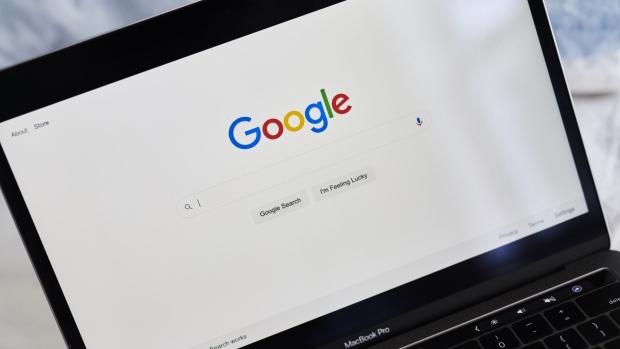Nov 6, 2023
Google Competes for Searches With Everyone Online, Expert Says
, Bloomberg News

(Bloomberg) -- Google not only competes with Amazon.com Inc., Expedia Group Inc. and Yelp Inc. for consumers to use its search engine for information, but also with websites such as General Motors Co., Mustang parts retailer CJ Pony Parts and the DC federal court, the company’s economics expert testified.
Over three days of testimony, Mark Israel, an economist with FTI Consulting Inc.’s Compass Lexecon, argued that the Justice Department was wrong to compare Google to other general search engines like Microsoft Corp.’s Bing and DuckDuckGo since it also competes with other places online depending on the query.
“Each query made by a user is a meaningfully distinct choice about where to go get information,” Israel said Monday in a Washington, DC courtroom. “Amazon competes for shopping queries, Expedia competes for travel queries, and Yelp competes for local queries.”
The testimony counters Justice Department allegations that Google illegally maintains control over the search engine and advertising market. Antitrust enforcers allege that Google, which controls nearly 90% of online queries, has broken antitrust laws by paying as much as $26 billion in 2021 to maintain its search monopoly by ensuring its search engine is the default on web browsers and mobile phones. Google’s dominance over the industry has allowed it to raise prices on advertisers without consequences, the agency maintains.
Israel, whose testimony is expected to wrap up Monday, said the Justice Department’s case assumes that a website like Amazon doesn’t matter because it doesn’t compete with the Alphabet Inc. unit on every query. His testimony was expected to wrap up Monday.
But the Justice Department sought to undermine Israel’s testimony, noting that a judge earlier this year rejected Israel’s opinions saying they “demonstrated misunderstanding and misapplication of antitrust concepts.”
‘Arbitrary, Unfounded’
Israel served as the main economic expert for American Airlines Group Inc. in the Justice Department’s antitrust suit challenging its partnership with JetBlue Airways Corp. A federal judge found the alliance violated antitrust law and ordered it unwound earlier this year.
In his opinion, the judge overseeing the case called out Israel as offering “arbitrary, unfounded” views with “the demeanor and tone of an advocate invested in the outcome of the case,” Justice Department attorney Kenneth Dintzer said.
Israel acknowledged the opinion, saying he had worked on hundreds of antitrust cases and could think of at least two where the judge rejected his opinions.
Israel also served as the expert witness for the US Federal Trade Commission in 2015 when it successfully blocked the proposed merger between Sysco Corp. and US Foods Holding Corp. Judge Amit Mehta, who is overseeing the Google case, sided with the FTC in that suit.
Under questioning by Dintzer, Israel said he wasn’t aware that Google in 2019 studied whether Amazon was taking away queries. In another study, Google found that Amazon app users were more likely to be regular and frequent Google users. “No evidence of negative impact on google.com from app adoption,” Dintzer said, reading from internal Google documents.
Israel said Google and Amazon are competing for queries — and the advertising that comes along with them — not product shopping.
During his presentation, Israel offered a slide showing shopping, education and jobs, local, and travel companies that compete with Google. In response to questions, Israel said that those companies don’t necessarily compete against each other as both Google and Amazon would offer results for the book “Goodnight Moon” but Home Depot Inc. probably wouldn’t.
Dintzer pointed out that under Israel’s formulation, Google would compete with everyone online, including General Motors, the Justice Department and even the federal courts since those websites also have search functionality. A person could go directly to those websites to find information instead of searching Google, Dintzer said.
Israel said those websites compete with Google “a tiny bit.”
“Any query that Google could have gotten and doesn’t get takes a little bit away from Google,” he said. “Google’s trying to answer as many queries as it can, and that took one away out of 80 billion.”
©2023 Bloomberg L.P.





